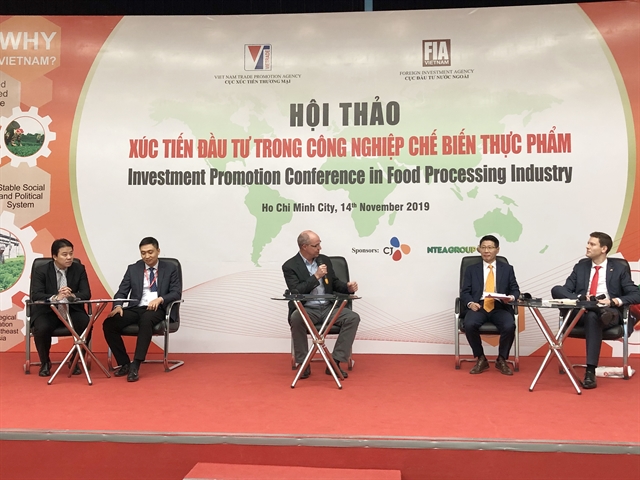Viet Nam will continue to solicit investment in food processing to add value to the industry, a conference heard in HCM City on November 14.

Viet Nam will continue to solicit investment in food processing to add value to the industry, a conference heard in HCM Cityon Thursday.
Hoang Minh Chien, deputy general director of the Vietnam Trade Promotion Agency, told the Investment Promotion Conference in the Food Processing Industry: “The agro-forestry and aquatic products processing industry has enjoyed an annual growth rate of 5-7 per cent in 2013-18.
“As a result, its exports grew by 8-10 per cent a year to a record of US$40.02 billion last year, making Viet Nam one of the biggest agricultural, forestry and aquatic products exporting countries in the world.”
These products are exported to over 180 countries and territories, including demanding markets such as the EU, the US and Japan, he said.
But the sector still has bottlenecks in the production value chain, including low processing technologies and erratic supply of raw materials, he said.
Matthias Ehrtmann, representative of EUROCHAM, said Viet Nam has great tropical fruits, but only exports 10-15 per cent of fruits and vegetables in processed form. “No processing means no added value,” he said.
Frauke Schmitz-Bauerdick, country manager of the German Trade and Invest in Viet Nam (GTAI Vietnam), said: “Food processing, and by processing adding further value, is an important trend that Vietnamese industry faces right now. Entering food processing is getting even more important in view of the new opportunities that are opening up because of Viet Nam’s membership in modern free trade agreements.”
Trade will be getting easier, cheaper and possibly faster, but to be competitive in highly developed markets, Viet Nam's food industry has to comply with strict food security and quality requirements, she said.
“One crucial aspect of being able to provide high-quality food products is right equipment. Modem machinery, especially in food processing, helps keep food products fresh, healthy and enjoyable.
“Competitive equipment is ultimately a prerequisite for creating internationally competitive food products.”
Chien said Viet Nam has set an export target of $65-70 billion for agriculture, forestry and fishery products by 2030, but for this processing technologies should reach at least reasonably advanced levels.
“Therefore, enhancing co-operation with partners who have modern technologies is among the important solutions,” he said.
Le Hong Minh, director of Vietrade’ s Investment Promotion Centre for Industry and Trade, said foreign investment in the food processing sector is estimated at $11.2 billion in 717 projects.
“These investments often focus on quick capital recovery projects such as processing agricultural products, beer and liquor and seafood processing.”
Foreign enterprises have little or no investment in raw material areas, he said.
“Most foreign investors in the food processing industry are from Asian countries and territories such as Thailand, Taiwan, Malaysia, South Korea, and China. Despite offering preferential policies, we have not been able to attract investment from countries with strong food processing industries like Japan, the US, Australia, and EU members.”
Nguyen Noi, deputy director general of the Foreign Investment Agency, said foreign investment in the food processing industry remains modest compared to other industries at about 3 per cent of total investment.
The country would continue to solicit foreign investment, especially from the US and EU, in the food processing industry, he said.
The Government is also offering incentives to investors, with priority given to projects with advanced and environment-friendly technologies and creating high-added value products, he said.
Chien said: “Viet Nam’s food processing industry has huge potential in terms of both the domestic market and exports.
“I think this is a good opportunity for foreign investors to invest in the food industry in Viet Nam. At the same time Vietnamese businesses, organisations and localities also need to actively promote and introduce their potential and capabilities to investors to promote investment.” — VNS




